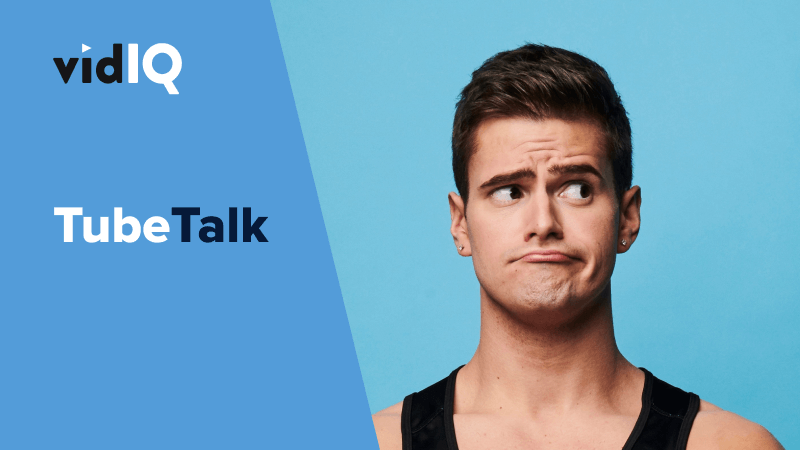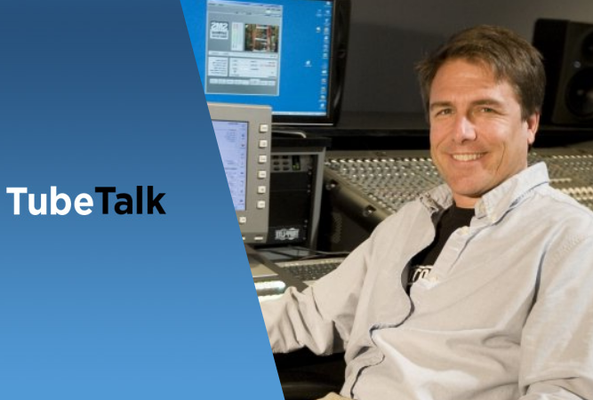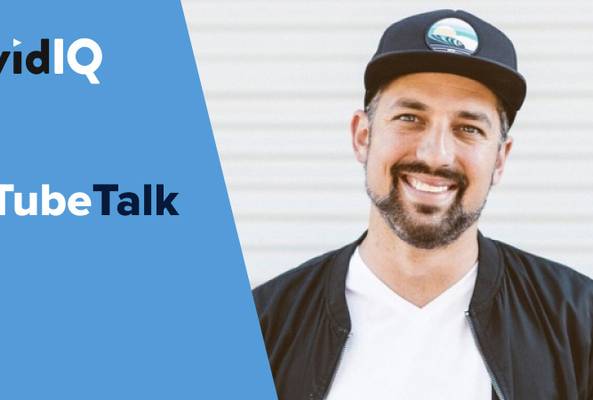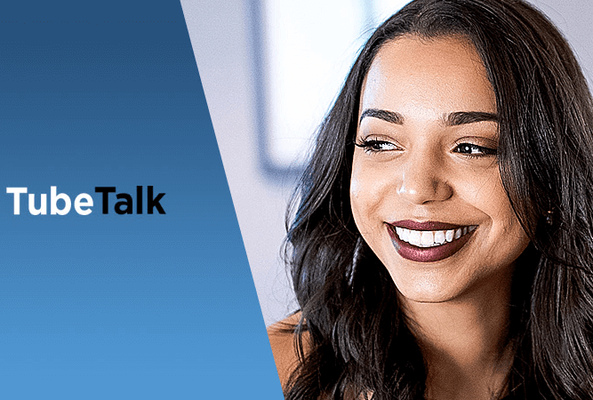Liron Segev, aka TheTechieGuy, is the Director of Customer Success at vidIQ, an internationally celebrated Digital YouTube Strategist working with some of the largest brands and YouTube influencers in the world. Over the past 20+ years, his work has taken him to South Africa, the UK and the US where he frequently speaks at conferences and provides expert tech commentary for various print publications, radio, and TV while actively running his Tech YouTube Channel.
How to Make Money With YouTube When AdSense is Not an Option: TubeTalk 206 with Caleb Marshall
YouTube is an amazing platform for viewers to find entertainment and information resources. It’s also an amazing platform for creators to earn revenue from ads run against the entertaining and educational content they upload. But what if revenue from AdSense isn’t an option?
On this week’s TubeTalk we talk to Caleb Marshall, a fitness instructor with over 2.3M subscribers on YouTube. Caleb is passionate about the content he makes - hugely popular workouts set to some of the biggest tracks around.
Due to legitimate copyright restrictions, he can’t generate revenue from AdSense against those videos, but instead uses YouTube to earn money from other successful business ventures built around his brand. In this podcast you will learn:
- How you can turn any hobby into YouTube content
- How to make a business out of that hobby on YouTube
- How to grow your business away from YouTube
- How to leverage your YouTube brand to grow other successful ventures

Subscribe to TubeTalk: The Video Marketing Podcast!
TubeTalk has been informing video creators and marketers since 2014, and is one of the most respected and listened to podcasts in the online video industry. Subscribe today so you never miss an episode! You can find vidIQ's TubeTalk at:
How to Make Money With YouTube When AdSense is Not an Option: Podcast Snapshot
Liron Segev: Tell us how you got started. What happened when you picked up your camera and you decided, okay, YouTube is the place for me. How did that journey start?
Caleb Marshall: It was really by accident. I wish I could say that it wasn't but before I started my channel. I didn't watch YouTube, I didn't know anything about YouTube. I had just grown up playing with cameras and iMovie and I loved making little home videos but I really was never immersed in the YouTube culture.
However, I was teaching these dance fitness classes at my college as a hobby, and I recorded myself. I just had a lot of fun in the creative process and I threw those videos up on YouTube and I just kept doing that every couple of weeks or so. Within eight months I had 100,000 subscribers. It was then I decided to get more serious.
I was happy with my content, but I didn't know exactly how I wanted to shoot it or present it. But I did have a brand behind it and a vision and I think having that vision is what allowed me to keep going. Because it was less about the little details and having every shot perfect or having multiple cameras. It was just using what I had in the moment and just having a vision of where I kind of wanted it to go.
Liron Segev: The whole thing with YouTube is that yes, a lot of people do this as a hobby and at a certain point you tend to go, Oh, hold on, this is actually a thing. I'm actually getting some traction. People are loving what I'm doing. You went in with a vision, you had an idea and you said, "Well, it doesn't have to be perfect. I just want to produce my content, put it online and see where this leads and then turn it into a business. Get it out there."
Caleb Marshall: I've been doing the same format of videos for five years but always improving on the production values. The goal is to get everybody up and moving, no matter what level you are, you should be able to play the video and follow along.
You should laugh, you should be having fun. It should be something that adds value to your day or takes the stress away. That's my goal is really just to bring joy into people's lives through easy to follow along with the dances.
Making the move from Indiana to LA was the smartest thing I've ever done for YouTube. I know you can really do it anywhere but with me not monetizing any of my videos, I really had to count on making those connections and real relationships out in the industry.
Liron Segev: Okay, Whoa. You have videos with millions of views, like this one where you do a routine to Meghan Trainor’s “Me Too” but you don’t earn revenue from them?
Caleb Marshall: I haven't made a dime off those videos. Actually I've had to pay.
Liron Segev: Okay, you're going to have to break it down for us. Why is that? We know that we want to make videos on YouTube and hopefully and that's going to bring us money. You have 26 million views on a video and you're not making a cent? What's going on?
Caleb Marshall: No, and that's the problem. I started the channel but just out of passion. It was never started as a business and when it became something that I could leverage, something I really wanted to invest all my time in.
Then I had to get creative and figure out how I could do what I love and make money because everyone's first suggestion to me is, just don't use copyrighted music but that wouldn't make me happy and therefore I wouldn't want to be doing this.
As I've gone on, I've had to find a balance and now we do like YouTube memberships and that's been really awesome because I can give people hour long workouts instead of just one song at a time and I can find a way to monetize my audience there. We can go on tour but I've had to get really creative and it's been an uphill battle.
Four months ago we had a label contact us and we had to remove almost 50 videos. The Megan Trainor one, the Sia one. I mean those were all gone. All my views were gone and I mean the labels were just coming for us really hard and were upset that we were using their songs.
It's confusing because then I have other record labels coming to me and saying, "Hey, will you please use my music? We'll pay you to use my music." It's very confusing but monetization isn’t turned on for any of my videos unless there's been a deal with the record label.
Liron Segev: Copyright music is obviously quite a big pain at this stage because it makes sense you to use the latest and the greatest tracks that are out there, but now you have a problem because the labels are saying forget it. They are either they're telling you to take it off or that telling you that if you are monetizing, we going to earn that revenue.
Caleb Marshall: I don't want to work with labels who don't support me. I don't want to support people who don't support creators and so I've just made a choice that I'm never using music from that label again, whether they want me to or not, I just want to focus on working with people who see me as a value, see me as a marketing tool because really that's what my YouTube channel is. It's a marketing tool for music.
Liron Segev: You've mentioned you do memberships, which is your one form of revenue but then you did also say that you go on tour. Tell me about the tour part.
Caleb Marshall: Yes. Well that's my favorite thing. That's what I started doing in college was teaching live classes. YouTube was always just a way to kind of get out there what I was already doing. Doing the YouTube videos allows me to sell tickets for basically a “cardio concert” and we rent out concert venues.
It started out like local YMCAs, your local gym but now we're renting out concert venues and doing live shows there. We have lights and sound and we'll have little skits in between.
There's like a 15 song playlist and it's all the songs from our channel and so people know that dance is kind of already when they come but I'm instructing and everyone's following along and it's like a big sweaty, sexy church service. It's amazing.
Liron Segev: How do you use your social media?
Caleb Marshall: I really think it changes. I love Instagram - I feel like that's kind of my homepage. I feel like Facebook used to be that for me. Facebook used to drive all of our ticket sales. It was our driving factor of our business model and then when the algorithm shifted overnight, we just stopped selling tickets to tours.
People stopped seeing my content. It was crazy and immediately you internalize all that and you go, Oh my God, people hate me now. But then I talked to other people and everyone's like, no. The same thing happened to me. I use TikTok but that's just to make me smile.
Liron Segev: You understand when things are going right and you understand when things are going wrong. Almost like it's a real business. That's the message I'm trying to drive a lot home into people that your channel is a business and whether you started out that way or you didn't start out that way.
At a certain point you realize that your channel has expenses, you have to travel to events, you have to buy equipment, that things cost money and as soon as you start making that conversion from how it's a hobby too, oh wow, this is actually a business. That's exactly what you've done consciously, which is great and therefore you're able to stay that are one step ahead.
Caleb Marshall: I also think it's also a unique place for me since I am not monetizing the videos, I'm more conscious about how I use this to help my other business models that are making money, or how to use this to direct people to my YouTube memberships. It's a weird blessing that I don't have to be so concerned with monetizing a quick viral video.
It’s also a myth that a viral video will take a creator and carry them to the promised land. That’s just not the case.
Liron Segev: You'll get your bump, you'll get your exposure but it's your channel that delivers and that's what I love about your channel is that you don't rest on the one video. Every video is you putting your heart and soul into it. You can see the energy jumping off the screen and I dig that. It’s awesome that you're appealing to such a wide community and that's the power of the internet.
If people want to find you, they want to follow you, they want to get into everything that you have to offer, where can they track you down?
Caleb Marshall: They can track me down on YouTube at The Fitness Marshal. I also have a vlog channel and a website. Most importantly I just launched a new podcast with one of my now best friends and ex-girlfriend, Hayley. It's called Coffee With My Ex is a podcast and we talk every week and it's very funny and exciting and a new adventure so go check it out.
Want To Get More Views on YouTube?
If you want to take your YouTube channel to the next level and get more views on YouTube then make sure to download vidIQ. Join over 1 million other users and use vidIQ to help you research YouTube, analyze videos, audit your own channel, and take actionable steps click here to install now!
And if you’re really serious about growing your YouTube views and subscribers, sign up for exclusive access to the vidIQ Academy and learn how to launch a successful YouTube Channel in just 30 days.



